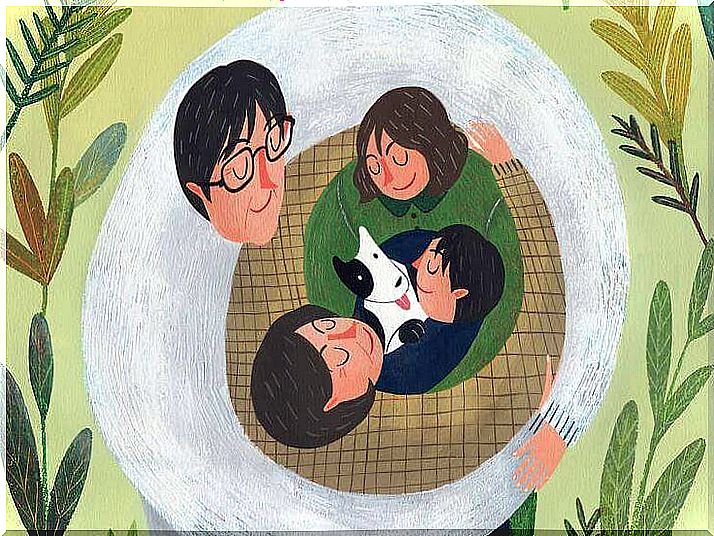Parenting Strategies For Preventing Anxiety In Children

Being a father, being a mother, is not an easy task. We don’t come into the world with a textbook that tells us how to educate happy children who will grow up to be mature adults, capable of achieving whatever dreams they may be.
We could say that today one of the major problems facing parents is the anxiety of the little ones. Nervous behavior, sleep problems, almost irrational fears… What are they due to?
If you see that one of your children is behaving anxiously, first of all avoid correcting them with punishments and negative sentences. Far from helping them, you only increase the tension in them.
Believe it or not, we all have confrontational strategies that allow us to resolve given situations. Above all, you have to remember that it is not about being the best mother or the best father in the world.
It’s about being always present. It is about being a good example, a good role model on which children can find support and example.
Today in this article we want to teach you how to manage anxiety in children.
Anxiety in children: what is the origin?

You may have heard more than once that “anxious children are reflections of their parents”. You should know that the reasons why our children suffer from anxiety can cover different realities.
We are sure that these kinds of sensations and emotions are familiar to you. We could say we all know what anxiety is. We experience it at work, in our relationships… But why do children suffer from it?
- According to a study published in the journal “The American Journal of Psychiatry”, children of parents who have anxious behaviors have a greater propensity to develop the same problem.
- Children, at some point in their childhood, can develop fear. The fear of being alone, of being abandoned… And even to the point that any separation, such as leaving them at school, can make them anxious. We need to understand the origin of these fears.
- There are experiences that the little ones do not understand or cannot fully comprehend. The loss of a loved one such as a grandparent, for example, can awaken in them certain irrational thoughts capable of drifting into anxiety disorders.
The emotional and personal world of a child is as complex as it is sensitive. Parents cannot access all the niceties, and cannot make their life as easy as they would like.
Hence the interest of being very attentive, listening, talking, putting yourself in their place. Anxiety in children is a symptom that must be understood and addressed.
How to prevent and treat anxiety in children

Appropriate strategies and education based on Emotional Intelligence can undoubtedly help us prevent and cure anxiety in children.
According to the study previously cited in “The American Journal of Psychiatry”, and directed by psychiatrist Golda Ginsburg, we are told that sometimes, it is enough for one of the parents to have an anxious behavior for the children, especially between 6 and 13 years old are diagnosed with anxiety disorders.
The same author also explains to us that there is no single cause for this type of problem. In reality, it is a combination of genetic and environmental factors.
If we or our partner have an anxiety disorder, it is undoubtedly best to deal with the problem and be aware of it so that our education is not based on these behaviors which sometimes emerge without even as we realize it.
Let’s see now what are the most suitable strategies for preventing and coping with anxiety in the little ones:
1. Children must face their fears
You may be afraid that something will happen to your children. Overprotection generates anxiety in children, whether we like it or not. We must allow them to be able to face their fears.
Fear of going to a new school where they don’t know anyone, fear of not being good enough on your football team, fear of asking questions in class, fear of going two days without seeing you because they leave on an excursion …
We must allow them to develop their own strategies of confrontation. When they do, and overcome their fears, they will feel proud of themselves.
2. Convey positive messages
Praise your children for all the things they do well, and most importantly, avoid punishing or criticizing them when they do something incorrectly.
Mean punishments or contemptuous words like “you are awkward” create strong anxiety in children. Negative messages create avoidance behaviors, hence the value of stimulating, encouraging and supporting.

3. Understand what is important to your child
Sometimes we devalue things that are important to them and we don’t even see them, due to the lack of time.
If your child appreciates that you tell them that their drawing is pretty, that they say they got a good grade, or that they like this animal, listen to them. Seeing that we don’t value him creates uncertainty for him, and “not knowing” generates anxiety.
4. Talk about anything that scares him
Find out what scares him, no matter how insignificant. Is he afraid of the dark? Doesn’t he want to go to college alone? Is he afraid of missing an exam?
Talk to your children about their fears and do so with an understanding and caring attitude. Then implement a positive, hopeful resolution to remind him that he’s going to get there and that you will always be there for him.
Images by Jimmy Yoon, Claudia Tremblaya









